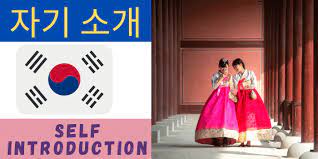How to introduce in Korean

Hi there!
Want to introduce yourself in Korean? Read this lesson. It’ll take you 3 minutes, and ALL the Korean lines you need are here.
If you don’t, I don’t care – this is ONLY for people that truly want to speak Korean.
OK! Here’s how you introduce yourself in Korean. You learn the 6 MUST-KNOW lines. We’ll go from 1-6 and translate it so you can easily start talking Korean ASAP.
1. Formal Way: Jeoneun (name)-imnida.
So first, let’s cover the formal way to introduce yourself in Korean.
- 안녕하세요? 저는 (name)입니다. 처음 뵙겠습니다.
- Annyeonghaseyo? Jeoneun (name)-imnida. Cheoeum boepgesseumnida.
- Annyeonghaseyo? Jeoneun John-imnida. Cheoeum boepgesseumnida.
- Hello, my name is John. Nice to meet you!
As you can tell, “Annyeonghaseyo” means “Hello,” then “Jeoneun (name)-imnida” means “my name is (name)”, and finally “Cheoeum boepgesseumnida” is “Nice to meet you.
2. Casual Way: (Name)-Ya. Bangawayo.
Here’s a more casual way to introduce yourself.
- 안녕. (Name)야. 반가워.
- Annyeong. (Name)–ya. bangawo.
- Hi, I’m (Name). Nice to meet you.
So, if you want to introduce yourself casually, just say your name and “ya.”
3. I am from … — (place) eseo wasseumnida.
- (place) 서 왔습니다.
- (place) eseo wasseumnida.
- 미국 miguk – America
- 미국서 왔습니다. Migugeseo wasseumnida. I’m from the U.S.A.
But what if you’re not from the United States? How can you introduce yourself in Korean and talk about YOUR country? Fear not; below is a list that will help you. Simply find your country and add it to the line above!
- Australia 호주 hoju
- Austria 오스트리아 osu t’ria
- Brazil 브라질 burajil
- Canada 캐나다 k’aenada
- China (PRC) 중국 chung-guk
- China (Taiwan) 대만 daeman
- England (United Kingdom) 영국 yeong-guk
- France 프랑스 p’urangsu
- Germany 독일 tok-il
- Hong Kong 홍콩 hong k’ong
- India 인도 indo
- Italy 이탈리아 it’al-lia
- Japan 일본 ilbon
- Malaysia 말레이지아 mallae-i jia
- Mexico 멕시코 maeksik’o
- Mongolia 몽고 mong-go
- Myanmar (Burma) 미얀마 miyanma
- New Zealand 뉴질랜드 nyu jeelaendu
- The Philippines 필리핀 p’ileepeen
- Singapore 싱가폴 sing-gap’ol
- Spain 스페인 sup’ai-in
- Sweden 스웨덴 suwei-dain
- Switzerland 스위스 suweisu
- Thailand 태국 t’ae-guk
- Vietnam 베트남 baet’unam
Now, let’s talk about your age.
4. “I am (age) years old” — (age) sal imnida.
- (age) 살 입니다.
- (age) sal imnida.
- 열여덟살 입니다. Yeolyeodeolsal imnida. I am 18 years old.
Okay, to fully introduce yourself in Korean and state your age, you’ll need to know numbers.
Below is a chart of the Korean numbers (there are 2 sets – this is the Korean Native System) which is used for age. If you’re wondering how to do in-between numbers like 23, 35, 47 and so on, heres what you should do.
- Take the Korean word for 20, 30, 40, etc. – whichever is your age
- Then take the single digit number (1-9)
- Add the two together.
- For example: 45 is…
- 40 is maheun
- 5 is daseot
- so, 45 is maheundaseot
- For example: 45 is…
| # | Korean | Romanization | ||||||
| 1 | 하나 | hana | 11 | 열하나 | yeol hana | 30 | 서른 | seoreun |
| 2 | 둘 | dul | 12 | 열둘 | yeol dul | 40 | 마흔 | maheun |
| 3 | 셋 | set | 13 | 열셋 | yeol set | 50 | 쉰 | shwin |
| 4 | 넷 | net | 14 | 열넷 | yeol net | 60 | 예순 | yesun |
| 5 | 다섯 | daseot | 15 | 열다섯 | yeol daseot | 70 | 일흔 | ilheun |
| 6 | 여섯 | yeoseot | 16 | 열여섯 | yeol yeoseot | 80 | 여든 | yeodeun |
| 7 | 일곱 | ilgop | 17 | 열일곱 | yeol ilgop | 90 | 아흔 | aheun |
| 8 | 여덟 | yeodeol | 18 | 열여덟 | yeol yeodeol | 100 | 온 | on |
| 9 | 아홉 | ahop | 19 | 열아홉 | yeol ahop | |||
| 10 | 열 | yeol | 20 | 스물 | seumul |
5. I am a (occupation). (occupation)-imnida.
Next, you’ll need to talk about your work or occupation in Korean.
- (occupation)-imnida.
- 학생입니다. Haksaeng-imnida I’m a student.
- 회사원입니다. Hoisawon-imnida. I’m an office worker.
6. “I’ve been learning Korean for….” — (time duration) dong-an gonbu-haesseumnida.
If your Korean is pretty good, Koreans will want to know about how you learned their language. So, that’s where this and the next phrase come in.
- (time duration) 동안 공부했습니다.
- (time duration) dong-an gonbu-haesseumnida.
- I’ve been learning for 1 month.
- handaldong-an gonbu-haesseumnida.
- 한달 동안 공부했습니다.
7. I’ve learned Korean in (place) — (place)eseo baewosseumnida.
- (place/location)에서 배웠습니다.
- (place/location)eseo baewosseumnida.
- I learned it in school.
- hakkyoeseo baewosseumnida.
- 학교에서 배웠습니다.
Conclusion on How to Introduce Yourself in Korean.
You learned two ways to introduce yourself. One was formal. One was casual. Let’s review them one more time but in roman letters. You may not know the alphabet (Hangul) yet.
- Casual: annyeong. (name)-ya.
- Formal: Jeoneun annyeonghaseyo. (name)-imnida.
Comments
Leave a Comment